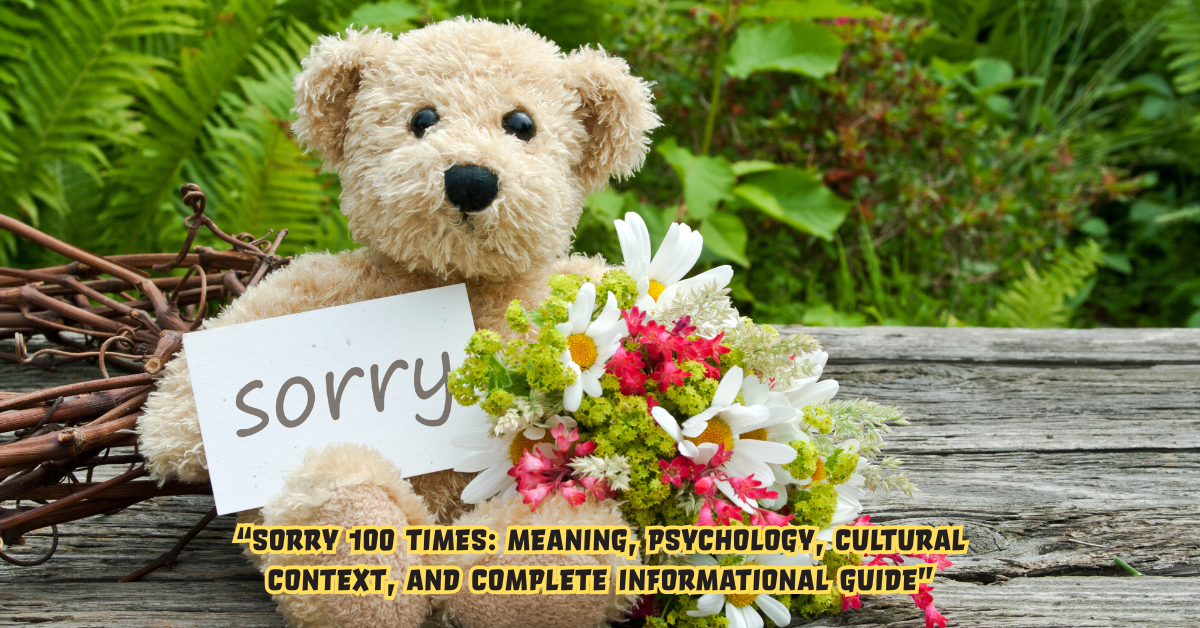The phrase “sorry 100 times” is not just about repetition of words but a reflection of human emotion, guilt, reconciliation, and the constant struggle between apology and forgiveness. For those searching this term, the curiosity often lies in understanding what it means to apologize excessively, whether saying sorry repeatedly holds any real value, and how cultural, psychological, and social dimensions affect its meaning. In essence, it raises the question: does saying sorry 100 times make it more meaningful, or does it dilute the very act of apology?
Apologies are central to human relationships. They carry weight, rebuild trust, and soften conflicts. But when overused or repeated excessively, they may create confusion. Some see it as a desperate attempt to regain acceptance, while others consider it insincere. The phrase has gained traction in modern digital communication—messages, memes, and conversations—where “sorry” is often typed multiple times, sometimes exaggerated to the point of saying it a hundred times.
This article explores the meaning, psychology, cultural perspectives, and social interpretations of “sorry 100 times.” It examines when repetition becomes necessary, when it turns excessive, and how societies across the world interpret frequent apologies. With insights from psychology, communication studies, and cultural observations, readers will gain a thorough understanding of why this phrase resonates and how it can impact relationships, mental health, and communication styles.
As one psychologist noted, “An apology is like a bridge—it must be strong, not simply built with endless repetition.”
The Literal and Figurative Meaning of “Sorry 100 Times”
At its surface, “sorry 100 times” refers literally to apologizing repeatedly, often in exaggerated form. Figuratively, it represents emotional intensity—someone trying to show desperation, guilt, or sincerity through the magnitude of words. In messaging apps, people often type “sorry sorry sorry” in quick succession, sometimes even counting how many times they send the word.
The deeper question is whether saying “sorry” so many times improves the chance of forgiveness. Psychologists suggest that repetition may reflect anxiety or insecurity rather than true remorse. A single, meaningful apology, expressed with sincerity and accountability, is often more effective than one repeated endlessly. Still, for individuals caught in guilt or urgency, “sorry 100 times” may feel like the only way to express the depth of regret.
The Psychology of Excessive Apologies
Apologies are tied to emotions such as guilt, shame, and empathy. But why would someone say sorry excessively, even up to 100 times? Psychological studies indicate that people who apologize excessively often suffer from low self-esteem, fear of rejection, or a heightened sense of responsibility.
This phenomenon, sometimes called “compulsive apologizing,” can emerge in relationships where one person constantly seeks validation. The act of repeating “sorry” over and over becomes less about the other person’s feelings and more about the apologizer’s anxiety. While it may demonstrate sincerity, it can also cause fatigue for the listener.
Table 1 illustrates the key psychological reasons behind saying sorry repeatedly:
Table 1: Psychological Reasons for Saying Sorry 100 Times
| Psychological Factor | Explanation |
|---|---|
| Guilt Overload | Overwhelming guilt leads to repeated attempts at apology. |
| Anxiety & Insecurity | Fear of rejection causes one to overcompensate with excessive “sorry.” |
| Habitual Communication | Saying sorry becomes a reflex, not always linked to genuine remorse. |
| Desire for Forgiveness | Belief that repetition increases the chance of being forgiven. |
| Power Imbalance | In unequal relationships, one apologizes repeatedly to avoid conflict. |
Cultural Interpretations of Repeated Apologies
Apologies carry different weight across cultures. In some societies, saying “sorry” is a rare and solemn act, while in others, it is woven into daily speech. For example, in Japan, apologizing multiple times is considered polite and respectful, even if the offense is small. In Western cultures like the United States, repeated apologies may sometimes be seen as weakness or insincerity.
Haridwar or Indian cultural contexts show another layer—here, repetition in speech, whether in prayer or apology, often symbolizes depth and humility. Saying “sorry” many times may align with traditions of showing respect and surrender. Conversely, in European contexts, excessive apologies may lead to frustration, with people preferring concise but meaningful words.
As a cultural critic once observed, “The number of sorries reflects less of guilt and more of the society’s tolerance for repetition.”
The Digital Age: “Sorry 100 Times” in Messaging and Memes
In the digital communication era, “sorry 100 times” has become symbolic of how we exaggerate emotions in texts and online chats. On platforms like WhatsApp, Instagram, or Twitter, users often type “sorry” repeatedly or even copy-paste it hundreds of times. Sometimes it is serious, but often it is playful—an exaggeration to show embarrassment or lighten a moment.
Memes featuring “sorry 100 times” have become part of internet humor. They reflect how language adapts in digital spaces, where exaggeration creates relatability. Yet, the overuse of “sorry” in digital communication may also devalue its meaning, turning it into a casual phrase rather than a genuine emotional statement.
The Social Impact of Repeating Sorry
The way people interpret “sorry 100 times” varies depending on the relationship context. In friendships, it may come across as humorous or affectionate. In romantic relationships, it may signal desperation, reconciliation efforts, or insecurity. In professional environments, however, saying sorry excessively can undermine credibility and project weakness.
Sociologists highlight that repeated apologies can shift the power dynamics in relationships. The one who constantly apologizes may appear submissive, while the one receiving the apologies may hold control. Over time, this imbalance can affect mutual respect and equality.
Table 2: Situational Meaning of Saying Sorry 100 Times
| Situation | Interpretation |
|---|---|
| Friendship | Playful, affectionate, often used in jokes or light-hearted situations. |
| Romantic Relationship | Desperation, sincerity, or an attempt to repair damage at all costs. |
| Family | Demonstrates respect or guilt, depending on cultural upbringing. |
| Workplace | Seen as weakness, lack of confidence, or undermining authority. |
| Online / Social Media | Often exaggerated, humorous, or meme-driven expression. |
The Fine Line Between Sincerity and Overuse
Sincerity is at the core of every apology. Saying sorry once, with genuine emotion, often carries more weight than repeating it endlessly. The phrase “sorry 100 times” raises an important question: when does repetition become counterproductive? Communication experts argue that once the listener has acknowledged the apology, further repetition may feel excessive and dilute its meaning.
At the same time, repetition may serve as a healing mechanism for the apologizer. It allows them to release anxiety and demonstrate their commitment to making amends. The challenge lies in striking a balance where the apology remains sincere without overwhelming the recipient.
Practical Advice: How to Apologize Without Overusing “Sorry”
Instead of saying “sorry” repeatedly, experts recommend a structured approach:
- Acknowledge the mistake clearly – State what went wrong without excuses.
- Express genuine remorse – One heartfelt sorry is stronger than 100 repeated ones.
- Take responsibility – Show accountability for the consequences.
- Offer a solution – Suggest how you will avoid repeating the mistake.
- Respect boundaries – Accept when the other person needs time rather than endless repetition.
By shifting focus from the quantity of apologies to the quality of words and actions, relationships can heal more effectively.
Conclusion
The phrase “sorry 100 times” captures a universal human dilemma—when words alone feel insufficient to repair damage. Whether typed repeatedly in a text, spoken out of desperation, or used playfully in humor, it reflects the complexity of how humans express remorse. While repetition may sometimes emphasize sincerity, it often risks losing meaning and creating frustration.
From psychological roots to cultural interpretations, from online memes to real-life relationships, the journey of saying sorry excessively highlights one truth: apologies must be heartfelt, not mechanical. As communication experts remind us, “Apology is less about the number of times you say sorry and more about the changes you promise after.”
Ultimately, “sorry 100 times” is not just about words but about intent, accountability, and the courage to rebuild trust.
FAQs
1. What does “sorry 100 times” mean?
It refers to repeatedly apologizing, often exaggeratedly, to show regret, guilt, or humor in communication.
2. Is saying sorry many times effective?
Not always. A single sincere apology is usually more effective than repeating sorry excessively.
3. Why do people say sorry 100 times in texts?
In digital chats, repetition is often used for exaggeration, humor, or to show desperation for forgiveness.
4. Is apologizing too much unhealthy?
Yes, excessive apologies can reflect insecurity, anxiety, or imbalance in relationships.
5. How can one apologize effectively without overusing sorry?
Acknowledge the mistake, show remorse, take responsibility, offer solutions, and use actions rather than endless words.











